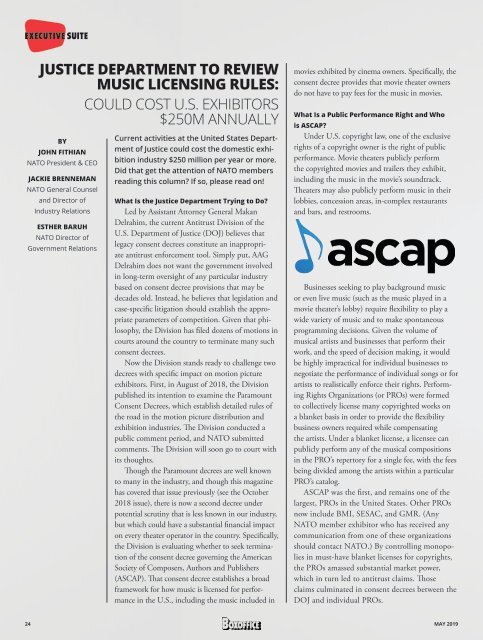Boxoffice - May 2019
The Official Magazine of the National Association of Theatre Owners
The Official Magazine of the National Association of Theatre Owners
You also want an ePaper? Increase the reach of your titles
YUMPU automatically turns print PDFs into web optimized ePapers that Google loves.
EXECUTIVE SUITE<br />
JUSTICE DEPARTMENT TO REVIEW<br />
MUSIC LICENSING RULES:<br />
COULD COST U.S. EXHIBITORS<br />
$250M ANNUALLY<br />
BY<br />
JOHN FITHIAN<br />
NATO President & CEO<br />
JACKIE BRENNEMAN<br />
NATO General Counsel<br />
and Director of<br />
Industry Relations<br />
ESTHER BARUH<br />
NATO Director of<br />
Government Relations<br />
Current activities at the United States Department<br />
of Justice could cost the domestic exhibition<br />
industry $250 million per year or more.<br />
Did that get the attention of NATO members<br />
reading this column? If so, please read on!<br />
What Is the Justice Department Trying to Do?<br />
Led by Assistant Attorney General Makan<br />
Delrahim, the current Antitrust Division of the<br />
U.S. Department of Justice (DOJ) believes that<br />
legacy consent decrees constitute an inappropriate<br />
antitrust enforcement tool. Simply put, AAG<br />
Delrahim does not want the government involved<br />
in long-term oversight of any particular industry<br />
based on consent decree provisions that may be<br />
decades old. Instead, he believes that legislation and<br />
case-specific litigation should establish the appropriate<br />
parameters of competition. Given that philosophy,<br />
the Division has filed dozens of motions in<br />
courts around the country to terminate many such<br />
consent decrees.<br />
Now the Division stands ready to challenge two<br />
decrees with specific impact on motion picture<br />
exhibitors. First, in August of 2018, the Division<br />
published its intention to examine the Paramount<br />
Consent Decrees, which establish detailed rules of<br />
the road in the motion picture distribution and<br />
exhibition industries. The Division conducted a<br />
public comment period, and NATO submitted<br />
comments. The Division will soon go to court with<br />
its thoughts.<br />
Though the Paramount decrees are well known<br />
to many in the industry, and though this magazine<br />
has covered that issue previously (see the October<br />
2018 issue), there is now a second decree under<br />
potential scrutiny that is less known in our industry,<br />
but which could have a substantial financial impact<br />
on every theater operator in the country. Specifically,<br />
the Division is evaluating whether to seek termination<br />
of the consent decree governing the American<br />
Society of Composers, Authors and Publishers<br />
(ASCAP). That consent decree establishes a broad<br />
framework for how music is licensed for performance<br />
in the U.S., including the music included in<br />
movies exhibited by cinema owners. Specifically, the<br />
consent decree provides that movie theater owners<br />
do not have to pay fees for the music in movies.<br />
What Is a Public Performance Right and Who<br />
is ASCAP?<br />
Under U.S. copyright law, one of the exclusive<br />
rights of a copyright owner is the right of public<br />
performance. Movie theaters publicly perform<br />
the copyrighted movies and trailers they exhibit,<br />
including the music in the movie’s soundtrack.<br />
Theaters may also publicly perform music in their<br />
lobbies, concession areas, in-complex restaurants<br />
and bars, and restrooms.<br />
Businesses seeking to play background music<br />
or even live music (such as the music played in a<br />
movie theater’s lobby) require flexibility to play a<br />
wide variety of music and to make spontaneous<br />
programming decisions. Given the volume of<br />
musical artists and businesses that perform their<br />
work, and the speed of decision making, it would<br />
be highly impractical for individual businesses to<br />
negotiate the performance of individual songs or for<br />
artists to realistically enforce their rights. Performing<br />
Rights Organizations (or PROs) were formed<br />
to collectively license many copyrighted works on<br />
a blanket basis in order to provide the flexibility<br />
business owners required while compensating<br />
the artists. Under a blanket license, a licensee can<br />
publicly perform any of the musical compositions<br />
in the PRO’s repertory for a single fee, with the fees<br />
being divided among the artists within a particular<br />
PRO’s catalog.<br />
ASCAP was the first, and remains one of the<br />
largest, PROs in the United States. Other PROs<br />
now include BMI, SESAC, and GMR. (Any<br />
NATO member exhibitor who has received any<br />
communication from one of these organizations<br />
should contact NATO.) By controlling monopolies<br />
in must-have blanket licenses for copyrights,<br />
the PROs amassed substantial market power,<br />
which in turn led to antitrust claims. Those<br />
claims culminated in consent decrees between the<br />
DOJ and individual PROs.<br />
24 MAY <strong>2019</strong>

















